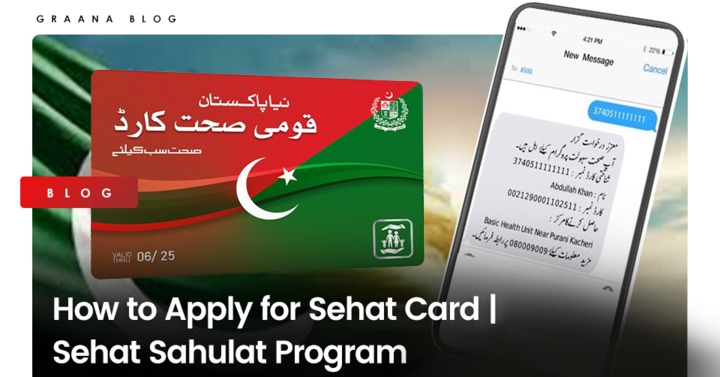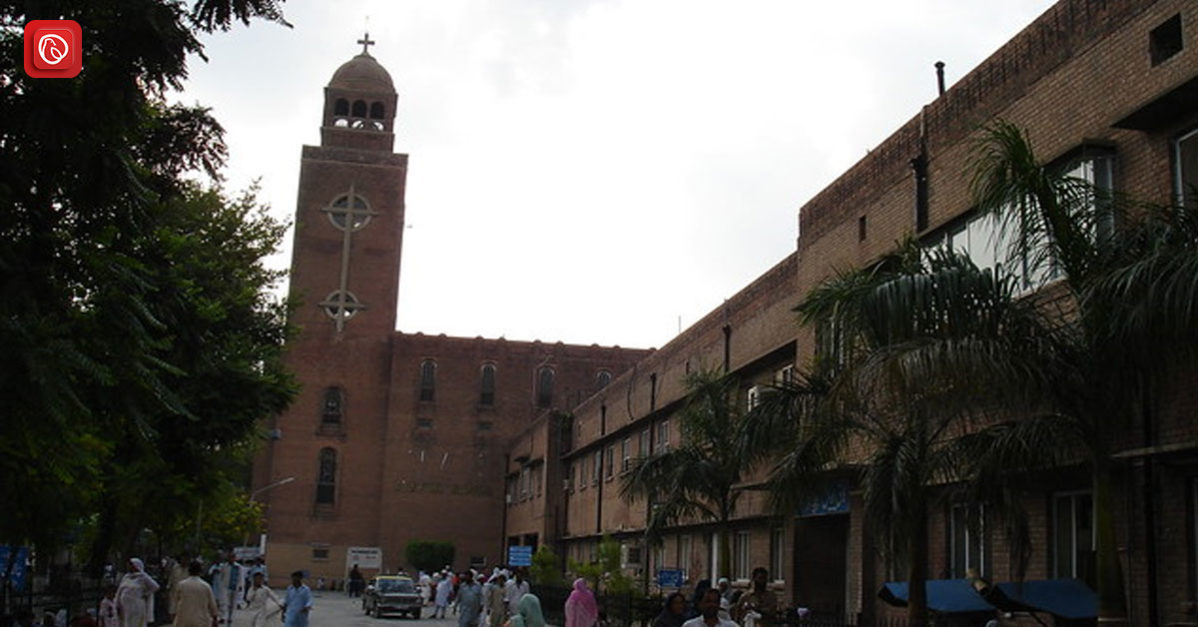Recently, the PTI-led federal government launched a health insurance program — Sehat Card Scheme, also known as Sehat Sahulat Program. In a developing country like ours where a large number of people don’t have access to basic health facilities, the commencement of a Sehat Insaf Card program means a great sense of relief among the residents of the country. Apply for a Sehat card to ensure health security.
The Sehat Insaf Card was initiated in partnership with the provincial governments and is available to the citizens of Khyber Pukhtunkhwa (KPK), Punjab, Balochistan, Azad Kashmir, Gilgit Baltistan (GB), Islamabad, and Sindh.
Graana.com, Pakistan’s smartest property portal provides you with a step-by-step guide on how to apply for Sehat Card Scheme.
What is Sehat Insaf Card/Sehat Sahulat Program?
Sehat Sahulat Program is a great step towards the betterment of the low premium health policies and social welfare reforms in Pakistan. It paves a way for the access of entitled medical healthcare to identified under-privileged citizens across the country with their entitled medical health care in a prompt and dignified way without any financial constraints.
Those who register under the program will be issued a Sehat Insaf Card through which they will be able to get the benefit of the service. Currently, the program does not cover OPD (outpatient department) services and is only available for the patients that get admitted to the hospital.
The Objective of the Sehat Sahulat Program
The PTI government believes that every citizen has the right to basic health facilities, however, the majority does not have access to these facilities, because of their poor financial condition.
To tackle the problem, the federal government devised this Sehat Card Scheme/ Sehat Sahulat Program.
SSP aims to boost the access of the impoverished to better quality medical health care services, through the Sehat Card scheme, and the stats received so far show that the government has been successful in achieving this target.

Sehat Card Information | Eligibility Criteria and Registration Process
To be able to take advantage of SSP, citizens will have to get registered under the program. However, before registration, they will be required to check whether they are eligible for Sehat Insaf Card or not.
To check the sehat card eligibility, you can use two different methods.
- Send SMS to Sehat Insaf Card number
- Check Online via the Official website
Registration method #1: Send SMS to Sehat Insaf Card Number
Simply text your National Identity Card Number to Sehat Card SMS number 8500, to check your eligibility for the SSP program.
Registration method #2: Check Online Via Official Website
- Visit the link https://www.pmhealthprogram.gov.pk/check-your-eligibility/
- On the upper side corner of the page, you will see a bar, asking you to write your CNIC.
- Write your CNIC and press enter.
For more information on Sehat Insaf card registration watch this video
What Does the Sehat Insaf Card Cover?
The Sehat Card program has devised two treatment packages, for the beneficiaries of the program. The details of the programs are given as follows.
- Secondary Care
- Priority Treatment
| Sehat Card Packages | Secondary Care | Priority Treatment |
| Initial Coverage | Rs60,000 /family/year | Rs300,000 /family/year |
| Additional Coverage | Rs60,000 /family/year | Rs300,000 /family/year |
| Total Coverage | Rs720,000 /family/year | |
Secondary Care
It is further classified into two packages initial coverage and additional package.
- In-Patient Services (All Medical and Surgical Procedures).
- Emergency Treatment requires admission.
- Maternity Services (Normal Delivery and C – Section).
- Maternity Consultancy / Antenatal Checkups (4 times before delivery and one follow-up after delivery).
- Maternal Consultancy for family planning, immunization, and nutrition.
- Fractures / Injuries.
- Post hospitalization.
- Local Transportation Cost of Rs1,000 (thrice per year).
- Provision of transport to tertiary care hospitals.
Priority Treatment
Likewise, the priority disease treatment package has two packages, initial coverage – Rs300,000 per year for a family, and additional coverage – Rs300,000 per year for a family.
- In-Patient Services (All Medical and Surgical Procedures).
- Heart diseases (Angioplasty/bypass).
- Diabetes Mellitus Completion.
- Burns and RTA (Life, Limb Saving Treatment, implants, Prosthesis).
- End-stage kidney diseases/ dialysis.
- Chronic infections (Hepatitis/HIV/Rheumatology).
- Organ Failure (Liver, Kidney, Heart, Lungs).
- Cancer (Chemo, Radio, Surgery).
- Neurosurgical Procedure.
How to apply for Sehat Card?
You can align with the process of using the Sehat Card with these simple steps.
Initial Steps
STEP 1: Check Your Eligibility
To verify your eligibility for the program, send your National Identity Card number to 8500.
STEP 2: Obtain Your Sehat Card / Qaumi Sehat Card
If declared eligible, collect your Sehat Insaf card / Qaumi Sehat Card from the designated card distribution center in your district. You can also use your CNIC as a sehat card now!
Further Steps
Step 1: Register yourself.

Once you have checked the eligibility criteria and have completed the registration process you will be issued the Sehat Insaf Card/Qaumi Sehat Card that you can use at empanelled hospitals.
You can get the Sehat Card from a nearby Card Distribution Centre developed in your district.
Step 2: Determine the empanelled hospitals for Sehat Sahulat Program
After getting the card, determine the empanelled hospitals for Sehat Sahulat Program.
When you go to visit the hospitals take the following documents with you:
- Sehat Insaf Card / Qaumi Sehat Card
- Original CNIC
- B-Form (In case of child treatment)
Step 3: Approach the Sehat Sahulat Program representative counter
After reaching the empanelled hospital you can approach the Sehat Sahulat Program representative counter for further assistance.
The staff there will verify your Sehat Insaf Card/Qaumi Sehat Card and will further guide you through the relevant department for treatment.
After getting admitted to the hospital, the cost of treatment shall be charged from the Sehat Insaf Card/ Qaumi Sehat Card.
NOTE: Only those who can avail of the facility who need to be admitted to the hospital.
Insaf Sehat Card Hospital List
The government has issued a list of both public and private empanelled hospitals in Pakistan, which you can find on the website of State Life.
Here is the list of the empanelled hospitals in Punjab, which includes some of the top hospitals of Rawalpindi, Islamabad, and other big cities.
| City | Hospital | Type | Address |
| Islamabad | Riphah International Hospital | Private Hospital | Opposite Gate 7 DHA Phase II, Sector K, Expressway, Islamabad |
| Rawalpindi | Rawalpindi Institute of Cardiology | Public Hospital | Main Rawal Road Rawalpindi |
| Faisalabad | Tehsil Headquarter Hospital, Jaranwala, Faisalabad | Public Hospital | Nankana Road, Near Police Station, City, Jaranwala, District Faisalabad |
| Gujranwala | Al-Shifa Eye Hospital Gujranwala | Private Hospital | Near Income Tax Office G.T Road, District Gujranwala |
| Lahore | Ayesha Hospital | Private Hospital | E-309 Nishtar Colony Lahore Cantt |
| Mianwali | Mianwali Hospital Complex | Private Hospital | Ballo, Khel Road, Mianwali |
| Multan | Al Huda Medical Centre | Private Hospital | Nishtar Road Multan |
| Sialkot | THQ Hospital, Sambrial | Public Hospital | Sambrial, Sialkot |
Receive Cost-Free Treatment
The cost of treatment, once the patient is admitted to the hospital, will be covered by the Sehat Insaf card / Qaumi Sehat Card.
Note: This facility is applicable only when a patient requires admission to the hospital.
Provide Government With Your Feedback About SSP
The government has provided the following number where beneficiaries of the Sehat Card program can place their feedback.
Phone: 0800-09009
Or you can send your feedback by filling out a complaint form on the official website.
SSP staff will also contact you for feedback after you have received the treatment from the hospital.
The Sehat Sahulat Program is quite new, and for the time being it is only available to the residents of Punjab. Also, it is only valid for indoor medical services, and no money can be withdrawn from the card. Hopefully, this blog answered all your queries regarding the Sehat Card scheme.
We hope this blog helped you with how to Apply for Sehat Card in Pakistan.
For similar guidelines, visit Graana blog.
Read More
- The Effect of Housing on Health
- List of Hospitals in Karachi
- List of Hospitals in Lahore
- A Guide to NADRA e-Sahulat in Pakistan
FAQs
Here are some FAQs related to how to make a sehat card
How can a Sehat Card be obtained?
A Sehat Card can be obtained by following a simple application process. The card can be applied for online or by visiting the designated government offices or healthcare centers.
What documents are required to apply for a Sehat Card?
To apply for a Sehat Card, certain documents are required, including proof of identity, proof of residence, income certificate, and other relevant supporting documents.
Can a Sehat Card be applied for by individuals of all ages?
Yes, a Sehat Card can be applied for by individuals of all age groups, including children, adults, and senior citizens.
What benefits are offered by a Sehat Card?
A Sehat Card provides various benefits, such as free or subsidized healthcare services, access to quality medical treatment, coverage for specific medical procedures, and discounted rates for medicines and diagnostics.
How long does it take to receive a Sehat Card after application?
The processing time for a Sehat Card application varies, but it generally takes a few weeks to receive the card after submission of the application and verification of the provided information.
Are there any fees involved in obtaining a Sehat Card?
No, there are no fees involved in obtaining a Sehat Card. The card is provided free of cost to eligible individuals.
Can a Sehat Card be used at any healthcare facility?
Yes, a Sehat Card can be used at designated healthcare facilities and empaneled hospitals and clinics that are part of the government’s healthcare network.
Can family members be included under one Sehat Card?
Yes, depending on the specific policies and eligibility criteria, family members can be included under one Sehat Card, allowing them to avail the benefits collectively.
Can a Sehat Card be used for pre-existing medical conditions?
Yes, a Sehat Card can be used for pre-existing medical conditions, as it provides coverage for a wide range of medical treatments and procedures.
How long is a Sehat Card valid for?
The validity period of a Sehat Card may vary, but it is typically valid for a certain duration, after which it needs to be renewed.




